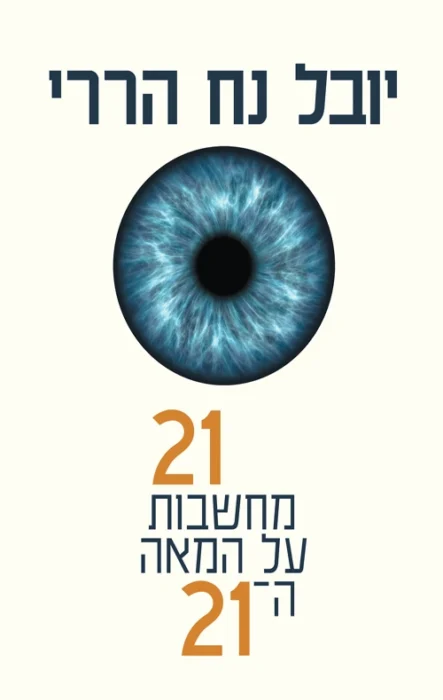Please scroll down for an English review.
"21 מחשבות על המאה ה־21" מצהיר על מטרה שאפתנית: להזריק בהירות לעולם עמוס בפייק ניוז, מניפולציות אלגוריתמיות ודיסאוריינטציה פוליטית וטכנולוגית. הפתיחה מסקרנת. היא נראית כמו קריאת השכמה שמבטיחה הרבה. אבל משם, הספר הולך ונשחק, מתפזר ומסיים בקול ענות חלושה. במקום לזקק מושגים ולהנגיש תהליכים, הספר לעיתים קרובות מעמיס פרטים, מחליק בין אבחנות עקרוניות, ובעיקר מציג את עמדותיו הפרטיות כעובדות מוחלטות.
התוצאה היא תערובת בעייתית: סגנון אקטואלי־פופוליסטי שמתחפש לחשיבה ביקורתית, בשילוב טון דידקטי שמסתיר את העובדה שאין כאן טיעון קוהרנטי אלא קולאז' של תובנות כלליות, לא תמיד חדשות ולא תמיד מדויקות. כשנח הררי עובר לדבר על "מניפסט החילוניות" שלו, מתערפלת ההבחנה בין תיאור לבין אידיאולוגיה. נוצרת תמונה של אידיאה חילונית חדשה, שלכאורה נקייה מדת, לאומיות ומטאפיזיקה, אבל בפועל מגלמת את שלושתן במסווה מודרני. יש הברקות, אך הן טובעות בעומס יתר של טענות לא מבוססות, סברות פרועות ומסקנות גורפות.
הררי מציב את המדע כשיטה אמינה לבירור האמת, ובונה את החילוניות החדשה על יסודות מדעיים אלה. אך הוא עושה זאת מבלי להתייחס לביקורת הפילוסופית החריפה שנכתבה בדיוק על הנקודה הזו. אף לא מילה על פוקו, לא על ברונו לאטור, לא על פרגמטיסטים אפיסטמולוגיים או מבקרי מושג האמת האובייקטיבית. במקום זה, מתקבל נרטיב שמציג את המדע כטהור, אמין ונטול אינטרסים. מגדל זכוכית מבריק שמתעלם מהמראות הסדוקות שמתחתיו.
אחד הקולות החשובים בתחום הזה הוא ברונו לאטור, פילוסוף וסוציולוג צרפתי, שטוען שאין דבר כזה מדע טהור המנותק מהחברה. לטענתו, ידע מדעי נבנה לא רק מתוך תצפיות ומדידות אלא גם מתוך תהליכים פוליטיים, חברתיים וטכנולוגיים: מי מממן את המחקר, אילו שאלות שואלים, איך מתקבלות החלטות. עבור לאטור, האמונה בעליונות המדע מתפקדת לעיתים כמו תיאולוגיה מודרנית. יש לה כוהנים, יש לה טקסים ויש לה אמיתות שלא ניתן לערער עליהן.
כאן מתחילה הבעיה. הספר מדבר על הצורך בחשיבה ביקורתית, אך מתקשה ליישם אותה על הנחות היסוד של עצמו. לדוגמה, ההנחה שבני האדם הם תוצאה של כוחות טכנולוגיים וחברתיים בלבד, ללא גרעין של רצון חופשי, מוצגת כאמת מוחלטת, לא כהשערה מורכבת או שנויה במחלוקת. הרצון לעורר את הקוראים לפעולה ראוי, אך לעיתים נשען על תחזיות היפותטיות, ניתוחים חפוזים ומסקנות שאינן עומדות במבחן לוגי. העובדה שתאגידים מנסים לתמרן אותנו אינה אומרת שנשתף עם זה פעולה באופן אוטומטי בכל זמן ובכל הקשר. דווקא כאן, הייתה דרושה הבחנה חדה יותר במקום הגזמה כללית.
זהו ספר קריא. לעיתים מרתק. וללא ספק מעורר מחשבה. הוא מציע מבוא נגיש לתהליכים גלובליים חשובים: עליית הבינה המלאכותית, קריסת הנרטיב הליברלי, ההשלכות הסביבתיות של הקפיטליזם, אך הוא נשאר בגדר מבוא ולא דיון. לא עיבוד עומק, ולא מבט צלול על מצב העניינים. הדרמה שהוא מתאר, המעבר של החילוניות מתרבות הגמונית לעוד סקטור, דורשת ניתוח מעמיק ונוקב הרבה יותר. בינתיים, מה שקיבלנו הוא עוד גרסה קולחת אך שטוחה למורכבויות של זמננו.
מדובר במפגש מתסכל בין פוטנציאל עצום, ברק אינטלקטואלי אמיתי, ובין אגו שמכתיב סדר יום אישי במסווה של ניתוח אובייקטיבי. הררי, סביר להניח, עוד ימשיך לנסח עבור העולם את דאגות העידן הדיגיטלי, אבל הספר הזה, למרות כמה רגעים מבריקים, פשוט לא עומד בהבטחה שהוא עצמו הכריז עליה. וחבל.
21 מחשבות על המאה ה- 21/ יובל נח הררי
הוצאת כנרת זמורה דביר, 2018, 352 עמ'
דירוג SIVI –
איכות אודיו –

21 Lessons for the 21st Century opens with a promising goal: injecting clarity into a world overloaded with fake news, algorithmic manipulation, and political-technological disorientation. The opening is intriguing, a kind of wake-up call with admirable intent. But from there, the book starts to fray. It scatters. And ends with a whimper rather than a bang. Instead of refining concepts or making processes accessible, the book often piles on details, blurs conceptual distinctions, and, most of all, presents its private opinions as settled truths.
The result is a problematic combination: a populist, topical style disguised as critical thinking, paired with a didactic tone that conceals the lack of a coherent argument. What we get is a collage of broad insights, not always new or accurate. Especially in the sections where Harari presents his “secular manifesto,” the boundary between description and ideology becomes blurred. What emerges is a secular ideal that claims to be free of religion, nationalism, and metaphysics, but reintroduces all three in modern guise. Occasionally, there are sharp insights, but they are drowned in an overload of unproven claims, wild speculations, and sweeping generalizations.
Harari insists that science provides us with a reliable method for discerning truth, and that modern secularism should be built on this scientific foundation. But he does so without acknowledging the substantial philosophical critiques of this very assumption. There's no reference to Foucault, Bruno Latour, or any epistemological critique that questions the idea of objective truth. The narrative presents science as pure, neutral, and above all, interests. A shimmering glass tower that ignores the cracks in the mirrors beneath it.
One of the most critical voices in this area is the French philosopher and sociologist Bruno Latour. He argued that there is no such thing as "pure science" detached from society. Scientific knowledge, he claimed, arises not only from observations and measurements but also from social, political, and technological processes: who funds the research, what questions are asked, and how decisions are made. In Latour’s view, Western faith in the supremacy of science sometimes functions like a modern theology, with priests, rituals, and truths that are not to be questioned.
And this is where the problem lies. The book discusses critical thinking but struggles to apply it to its premises. For instance, the idea that human beings are mere products of technological and social forces, devoid of free will, is presented not as a hypothesis, but as a definitive truth. The urge to awaken readers to action is legitimate, but it is too often based on hypothetical forecasts, rushed analyses, and conclusions that don't hold up under logical scrutiny. The fact that corporations try to manipulate us doesn't mean we always cooperate, automatically and universally. What’s needed here is a sharper distinction, not exaggeration.
This is an accessible book. Sometimes fascinating. And certainly thought-provoking. It offers a compelling introduction to major global processes: the rise of AI, the collapse of the liberal narrative, and the environmental consequences of capitalism. But it remains just that – an introduction. Not a genuine conversation, not a thorough analysis, and lacking a clear framework for understanding. The drama it describes, namely the shift of secularism from hegemonic culture to just another identity sector, deserves much deeper treatment. For now, we’ve been given a flowing but superficial version of the complexities of our time.
It’s a frustrating encounter between a real intellectual spark and a personal agenda masquerading as objective analysis. Harari will no doubt continue to shape the discourse on digital-age anxiety. However, this book, despite a few sharp moments, ultimately fails to deliver on the promise it made to itself. And that’s a shame.
לגלות עוד מהאתר Sivi's Books
Subscribe to get the latest posts sent to your email.

